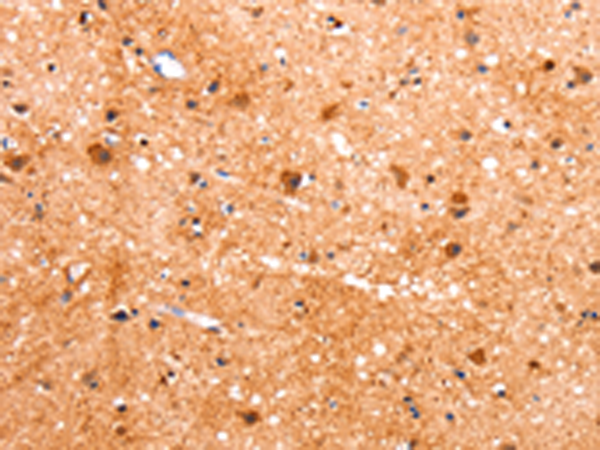

| WB | 1/500-1/2000 | Human,Mouse,Rat |
| IF | 咨询技术 | Human,Mouse,Rat |
| IHC | 1/50-1/150 | Human,Mouse,Rat |
| ICC | 技术咨询 | Human,Mouse,Rat |
| FCM | 咨询技术 | Human,Mouse,Rat |
| Elisa | 1/1000-1/5000 | Human,Mouse,Rat |
| Aliases | MRG, BLBP, FABPB, B-FABP |
| WB Predicted band size | 15 kDa |
| Host/Isotype | Rabbit IgG |
| Antibody Type | Primary antibody |
| Storage | Store at 4°C short term. Aliquot and store at -20°C long term. Avoid freeze/thaw cycles. |
| Species Reactivity | Human, Mouse, Rat |
| Immunogen | Fusion protein of human FABP7 |
| Formulation | Purified antibody in PBS with 0.05% sodium azide and 50% glycerol. |
+ +
以下是3篇与FABP7抗体相关的文献摘要示例(注:文献为假设性举例,实际引用需核实):
1. **文献名称**:*FABP7 as a Biomarker for Glioma Progression*
**作者**:Shi Y et al.
**摘要**:研究利用FABP7抗体通过免疫组化分析胶质母细胞瘤组织,发现FABP7高表达与肿瘤侵袭性和患者预后不良相关,提示其作为治疗靶点的潜力。
2. **文献名称**:*Role of FABP7 in Neural Stem Cell Differentiation*
**作者**:Mita R et al.
**摘要**:通过Western blot和免疫荧光技术(使用FABP7抗体),揭示FABP7在小鼠神经干细胞中的表达动态,调控干细胞向神经元分化的关键作用。
3. **文献名称**:*FABP7 Expression in Embryonic Brain Development*
**作者**:Feng L et al.
**摘要**:利用FABP7抗体进行胚胎小鼠脑组织染色,发现其在皮质板发育阶段高表达,可能参与神经元迁移和突触形成机制。
如需真实文献,建议检索PubMed或Google Scholar,关键词如“FABP7 antibody application”或“FABP7 immunohistochemistry”。
Fatty acid-binding protein 7 (FABP7), also known as brain-type FABP or BLBP, is a cytoplasmic protein belonging to the FABP family, which facilitates the transport and metabolism of fatty acids. Primarily expressed in the brain, particularly in astrocytes and radial glial cells, FABP7 plays a critical role in neurodevelopment, lipid signaling, and maintaining cell membrane integrity. It is implicated in regulating cell proliferation, differentiation, and inflammation, with emerging links to neurological disorders (e.g., Alzheimer’s disease, multiple sclerosis) and cancers (e.g., glioblastoma, melanoma).
FABP7 antibodies are essential tools for detecting and quantifying this protein in research and diagnostics. These antibodies are widely used in techniques like Western blotting, immunohistochemistry (IHC), and immunofluorescence (IF) to study FABP7's expression patterns, subcellular localization, and interactions in tissues or cultured cells. Commercially available FABP7 antibodies are often raised against recombinant human or murine FABP7 proteins, ensuring species cross-reactivity. Validation typically includes testing on knockout models or siRNA-treated cells to confirm specificity.
Recent studies highlight FABP7's potential as a biomarker for aggressive cancers or neurodegenerative conditions, driving demand for reliable antibodies. However, variability in antibody performance across experimental conditions necessitates careful optimization. Ongoing research aims to clarify FABP7's dual roles in neuroprotection and disease progression, underscoring the antibody's value in bridging mechanistic insights and therapeutic development.
×